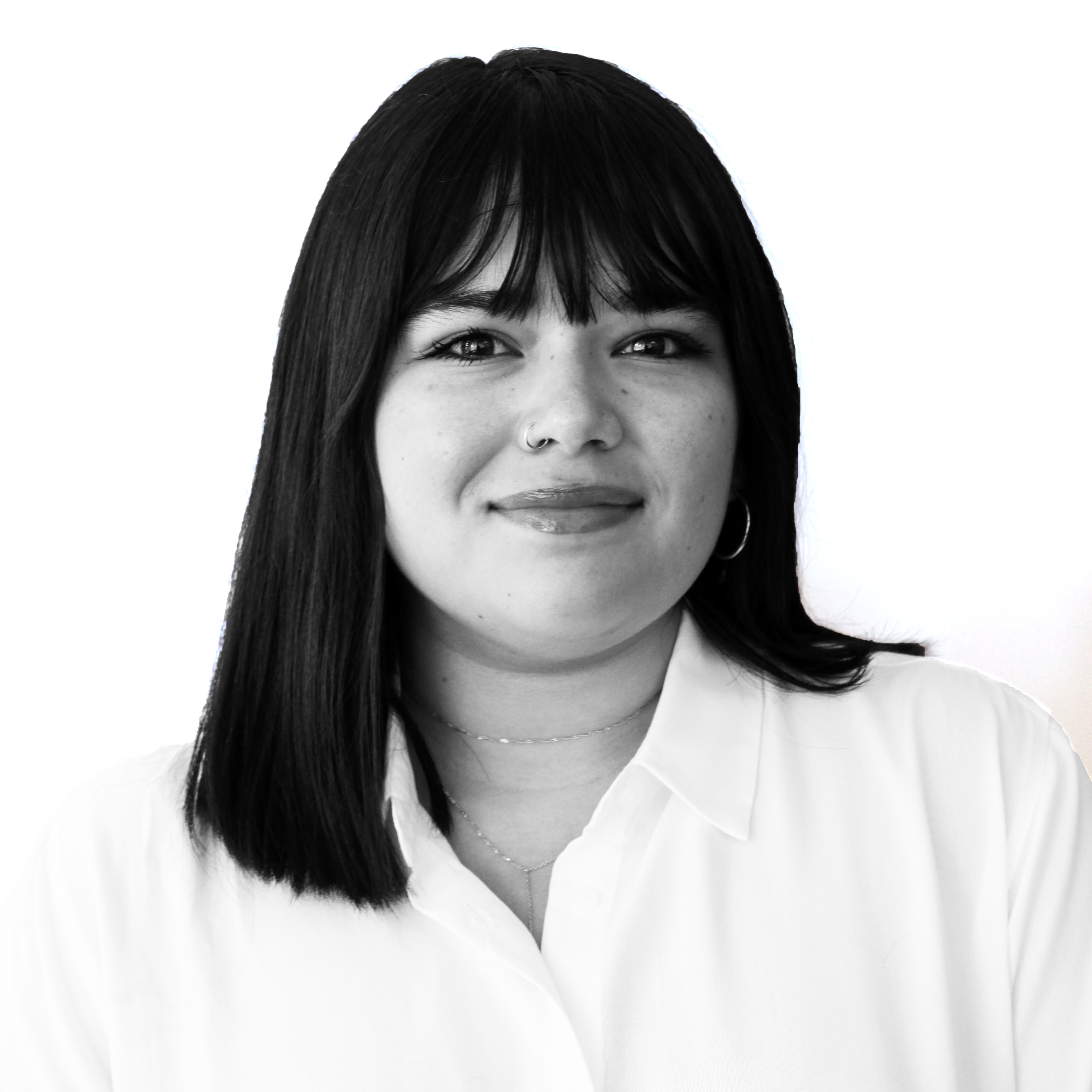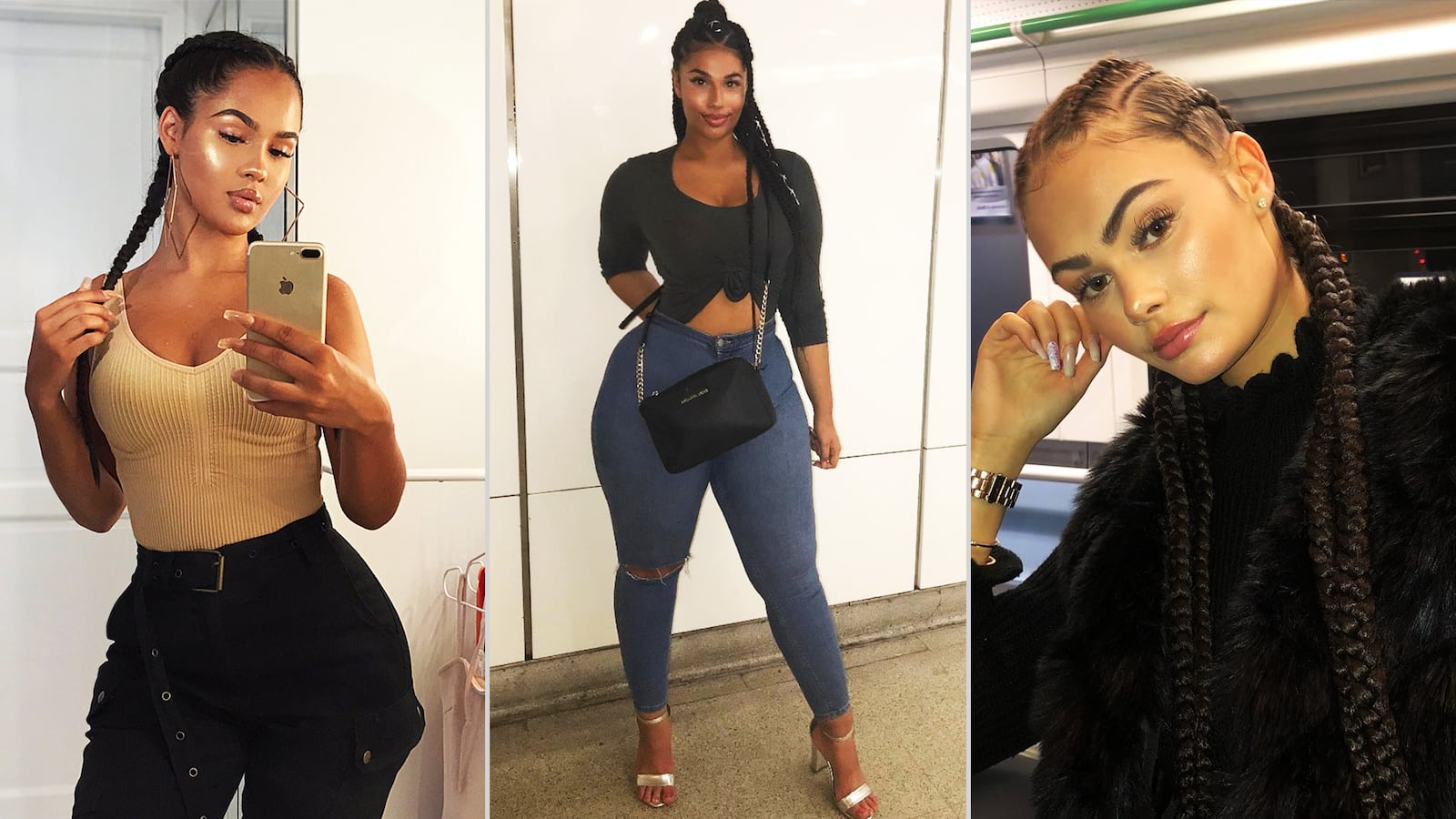At first glance, Emma Hallberg’s Instagram page looks like that of any other young, pretty social-media influencer of a certain age. Most of her photos are selfies, and nearly all of them see Hallberg pouting provocatively at the camera. In one photo, Hallberg poses in a neon green bodycon dress—her curvy figure, tan skin, and long, straight dark hair clearly the focus. “Neon colors always makes [sic] you look summer tanned,” the caption reads. In another photo, Hallberg crouches in front of a mirror, decked out in in a tube top, jeans, and thigh-high boots from Cardi B-endorsed clothing line Fashion Nova. Her caption, fittingly, seems to have been ripped straight from the Bronx rapper’s own Instagram page: “I could buy designer but this @fashionnova fit !”
There’s just one catch: Hallberg, despite Instagram evidence to the contrary, is white.
You’d be forgiven for thinking that Hallberg could be black, or mixed-race, or at the very least a woman of color. Her skin tone and hair seem to suggest a nonwhite background, and her penchant for long nails, hoop earrings, and curve-friendly clothes from the likes of Fashion Nova only further the assumption. In one photo, she also credits a wig/hair extension company, Ali Grace Hair, for her luscious locks—a brand predominately marketed to black women. And even though Hallberg’s bio clearly states “SWEDE | SWEDEN,” she doesn’t appear to be constrained by Scandinavian beauty standards at all. Her 200,000-plus Instagram followers seem to be largely unbothered by the fact that Hallberg presents herself as nonwhite.
Hallberg is merely one of many white or white-passing women on Instagram who’ve gained attention in recent weeks for their controversial styling that mimics the skin tone, hair, and aesthetic of many black women, and their unwillingness to be transparent about their non-black heritage—a practice dubbed “blackfishing” on social media. Most of these white women have significant Instagram followings, and most of them feel immune to criticisms of cultural appropriation—at least until a controversial Twitter thread called them out last week.
Aggregated by a since-suspended account called “NiggerFished,” which pulled most of its content from a previous thread by @Wannasworld, the thread (and account) sought to highlight “white people posing as black people on social media.” The thread quickly went viral before being deleted, and called into question the motivation of many white social-media influencers posing as black online, or at the very least, not immediately quashing assumptions that they were POC.
Instagram user Alicja Brzotowska, called out in the Twitter thread, could fall into the latter category. The 20-year-old, London-based Instagrammer has a staggering 22,000 followers, and frequently posts selfies highlighting her curvy physique. Coupled with her dark hair and tan skin, Brozotowska definitely doesn’t read as Caucasian at first glance. Recent photos and Instagram stories featuring Brzotowska sporting designer durags and box braids do little to dispel the notion that she’s not white.
In an email to The Daily Beast, though, Brzotowska was clear about her ethnic background. “I come from Poland originally,” she wrote. “However, my ancestors migrated from India, so it could explain the fact that I don’t have the typical pale skin and blonde hair [of Polish people].”
When asked about her decision to get her hair done in a style typical for black women, Brzotowska was candid. “I personally had the hairstyle done to promote and empower a friend’s black-owned business due to my following,” she explained, saying she “had no intention to imitate the culture [or] compare myself to a [sic] African female.” According to Brzotowska, we live in a “multicultural generation where energy should be focused in empowering a culture and not bringing it down.” Where cultural appropriation fits in this “multicultural” moment is unclear.
Brzotowska’s been accused of getting plastic surgery—namely, lip injections and butt implants— to achieve a curvier physique, but she insists that she’s merely struggled with her weight since she was a teenager. “I had many accusations that I had surgery due to a picture of me when I was 13 [being circulated online],” Brzotowska wrote in her email. “Everything is real, I had a weight journey and stayed consistent with the gym, and had put on weight and simply developed.” She clarifies: “No lip fillers or bum implants.”
“I would like to apologise for anyone that was offended,” Brzotowska writes at the end of her email. “However, I have never stated to be black or even compare myself [to black women]. I will never come close to understanding the struggles of women of colour and I can only educate myself.”
Brzotowska and Hallberg are hardly the only women on Instagram engaging in “blackfishing,” or at the very least, behavior veering into cultural-appropriation territory. A slew of equally white women with similarly large followings were also named in the viral Twitter thread. The problematic users in question range from the likes of @9mimmi, a white Kylie Jenner wannabe with a penchant for durags, box braids, and twists, to users like @Jaiahfern and Hannah Winifred Tittensor (aka @dirtyyhippie_), whose enthusiastic use of bronzer and self-tanner—and deliberate application of foundation several shades darker than their natural skin tone—borders on blackface.
But perhaps the most blatant case of “blackfishing” occurred in 2017, when white social-media influencer Victoria Waldrip, who uses the handle WoahVicky, claimed she was black in a since-deleted Instagram video. Remnants of the video still exist online today (because the internet is forever), and show an obviously Caucasian Waldrip, speaking in a grotesquely affected “blaccent” and sporting grills and a durag. “I’m sick and tired of telling y’all what freaking race I am,” she says in a clip from the video. “I’m black. B-L-A-C-K, end of story, black. Y’all never heard of light-skinned? That’s what I am. Light-skinned.”
Despite the fact that both of her parents are Caucasian, last year Waldrip decided to officially “come out” as black after posting the results of a questionable DNA test, which estimated 44 percent of her ethnicity was African (the rest was European).
Once WoahVicky established that she was, in fact, “black,” she apparently felt free to appropriate what she saw as “black” culture—she’d frequently post videos with her saying the N-word or twerking, and started incorporating culturally appropriative pieces (like cornrows or grills) into her looks. The final straw came when Waldrip decided to try her hand at rapping. A video posted from the session shows a gleeful Waldrip and two black men waving Glocks in the air. When the video drew the ire of none other than Snoop Dogg, Waldrip and crew retaliated with a similarly threatening video—prompting an official statement from Snoop, and finally, an apology from Waldrip and crew. “At the end of the day, we respect Snoop Dogg, because he a real O.G.,” Waldrip explains in her apology video.
Waldrip apparently had a change of heart, and deleted all of her inflammatory Instagram posts, tweets, and YouTube videos a few months ago, although most of her content lives on elsewhere. Waldrip has continued to post, however, albeit less frequently—a 20-minute YouTube video from last week finds Waldrip subdued and ruminating on the effects of fame. Waldrip’s cornrows and grills are gone, replaced with the admission that she might have “done some things differently” in her burgeoning career. The blaccent, however, remains.
Most of these white women seem to feel no remorse over posing as black, or exploiting elements of black culture for aesthetics and Instagram clout. And with white celebrities like the Kardashian-Jenner clan (Kim and Kylie, I’m looking at you) freely appropriating elements of black style in their own looks, it’s no wonder their admirers on Instagram and beyond feel comfortable doing the same. The recent outcry on Twitter, and in the comments section of many of these Instagrammers’ posts, suggests that, slowly but surely, people are done tolerating “blackfishing,” although the practice shows no signs of disappearing overnight.
When reached for comment by The Daily Beast, Emma Hallberg said she doesn’t see herself as appropriating black culture. She admits that Instagram is her primary source at the moment, and counts Rihanna, Sofia Jamora and Kylie Jenner as some of her influences.
“I am white (100% Swedish), and I have never said, claimed or tried to be anything else, and I do not see myself as anything else,” Hallberg said in her email to The Beast.
As for the Instagram photos in which she appears to be black or mixed, Hallberg said, “I do not know which pictures you refer to. As I said, I do not try to be anything that I am not and I do not see myself as anything else than white.” She added that she has naturally “dark brown eyes, naturally dark brown curly hair, and [a] natural tan I get during summer” that she claims could account for the confusion over her race. “People have also been accusing me of doing injections and surgeries to my nose, lips, face features and body to look like a black women [sic],” Hallberg wrote, “which I absolutely haven’t done!”
At the end of the email, The Daily Beast asked Hallberg how she would describe her style. Her answer was short and concise. “Highlighter is my signature,” she wrote, “and my style is my own.”






